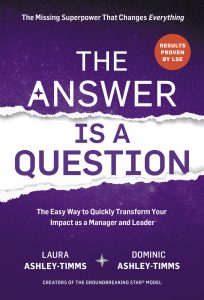By Dominic Ashley-Timms, below, CEO of performance consultancy Notion
 It’s no secret that employee burnout levels are worryingly high. But what about our leaders? The poor state of leader well-being seems to have flown under the radar despite a shocking 50% of managers reporting being burnt out.
It’s no secret that employee burnout levels are worryingly high. But what about our leaders? The poor state of leader well-being seems to have flown under the radar despite a shocking 50% of managers reporting being burnt out.
Stress tends to be regarded as “a part of the job description” for leaders. But when our well-being falls to the bottom of the priority pile and our stress is left unchecked, our productivity, morale and communication suffer, and so does our team—progress isn’t made, staff aren’t engaged, and culture begins to crumble.
What is causing this surge in leader and manager burnout? One reason is the mental model we operate under. Not only do we provide our team navigation, but we also try to help everyone who asks for it, solving every problem that our staff bring to us, taking on more work on top of our already demanding leadership responsibilities. This strain on our time and energy is proving impossible to cope with, pushing us over the brink and causing burnout.
Maintaining personal well-being is essential to providing the robust leadership that growing companies need to succeed. So, what can SME leaders do to protect themselves against the harmful impact of burnout?
Changing our approach to management
Moving away from the prevailing mental model for managers mentioned above is the crucial first step to improving leader well-being. This command-and-control style of directing, fixing and solving all of the problems brought to you, feeling pressured to have the answers and be involved in the smallest of decisions, creates a culture where employees rely on your approval before anything can move forward.
Celebrating your curiosity and uncanny problem-solving ability is almost certainly adding to your impossible work stack and probably marginalising your team, who see solving problems as your job and don’t even try to resolve issues themselves, leaning on you instead for direction. This not only risks stunting the progress of your people but also prevents them from developing the confidence and problem-solving skills to act when you’re not there.
Not addressing this will become a defining feature of our success and well-being as leaders. If we cannot manage ourselves and our workload more effectively, we’ll suffer more burnout, stress and overwhelm. And when the management tiers begin to buckle under the weight of the stress and the decision-making expectations from the tier below, then organisations become paralysed. Lacking direction. Disengaged. Now is the time to ditch the old command-and-control style and try a new approach.
Developing an Operational Coaching® style of management
How can we begin to move away from this damaging management behaviour? The key is for managers to develop more of an enquiry-led approach to management by adopting coaching-related behaviours into their everyday style of management, something that’s come to be called Operational Coaching®. This is different from trying to conduct the typically formal, sit-down, 1-1 coaching sessions, which many leaders simply don’t have time to do. More often than not, this approach doesn’t generate a measurable impact on team engagement but does add to an already overwhelming workload for the manager. Instead, developing a coaching mindset built around adopting some key behaviours allows us to integrate coaching into the flow of work. This creates a more collaborative relationship between you and your team, where you’re helping to stimulate their thinking when solving problems.
Applying the STAR® model can start this transition by helping us change our normal response to different situations.
- STOP—step back and change state
- THINK—is this a coachable moment?
- ASK—powerful questions and actively listen
- RESULT—agree on the next steps and an outcome from the conversation
When a team member comes to you with a problem, STOP. Not every problem needs an overstressed manager stepping in to do all the thinking. Avoid providing all the answers or mentally trawling your own mind for solutions. This is mentally taxing for you and also takes away a valuable moment to help the other person find the answer within themselves.
Breaking your natural impulse to direct and literally biting your lip wins you a moment to THINK instead about whether the situation could be a coachable moment, i.e. a time when a deft prompt from you could help this person explore the situation and possible solutions themselves.
If the person is capable and you think they might benefit from wrestling with the problem themselves (i.e. it is a coachable moment), then learning to ASK authentic and powerful questions intended to stimulate the other person’s thinking will help them to consider and reflect on the possible actions they can take. Such an enquiry-led approach can quickly encourage your team to step up and begin to share accountability for the workload. It also builds resilience, confidence and trust within teams, which is key for effective delegation, as managers can better distribute their workload or particular activities more equitably. This not only enhances a sense of ownership and fulfilment amongst team members but also improves productivity.
To secure a RESULT from this coachable moment, we must gain some form of commitment from the other person to act on their ideas. To do this, we must ask a few more questions to agree on the appropriate follow-up, increasing the probability that actions will be followed through and providing a future opportunity to give appropriate appreciative feedback.
Conclusion
It isn’t easy adopting a new management practice. Mounting pressure may revert you to firefighting and directing. But every time you can STOP and help others to think, you’re relieved of some of the mental burdens of day-to-day management. You can regain some balance to your workload by engaging the fullest talents of your team in this way, which will improve your well-being and help you avoid burnout.
Learning to shift our mental model of management away from directing others towards, instead, enabling others is the essence of developing an Operational Coaching® style of management and will pay dividends in terms of improved health and our overall effectiveness as a leader.
 Dominic Ashley-Timms is the CEO of performance consultancy Notion, creators of the multi-award-winning and globally-certified STAR® Manager programme being pursued by managers and leaders in over 40 countries. Dominic is also the co-author of the new management bestseller The Answer is a Question
Dominic Ashley-Timms is the CEO of performance consultancy Notion, creators of the multi-award-winning and globally-certified STAR® Manager programme being pursued by managers and leaders in over 40 countries. Dominic is also the co-author of the new management bestseller The Answer is a Question


